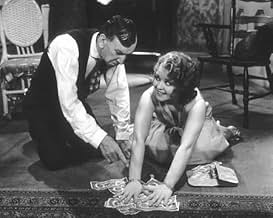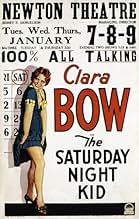Agrega una trama en tu idiomaMayme and sister Janie are salesgirls in Ginsberg's Department Store. Mayme is in love with store clerk Bill, but Janie tries to steal him from her. Hazel, another salesgirl, is Jean Harlow'... Leer todoMayme and sister Janie are salesgirls in Ginsberg's Department Store. Mayme is in love with store clerk Bill, but Janie tries to steal him from her. Hazel, another salesgirl, is Jean Harlow's first credited role.Mayme and sister Janie are salesgirls in Ginsberg's Department Store. Mayme is in love with store clerk Bill, but Janie tries to steal him from her. Hazel, another salesgirl, is Jean Harlow's first credited role.
- Dirección
- Guionistas
- Elenco
Alice Adair
- Girl
- (sin créditos)
Ernie Adams
- Gambler
- (sin créditos)
Irving Bacon
- McGonigle
- (sin créditos)
Getty Bird
- Riche Ginsberg
- (sin créditos)
Eddie Dunn
- Jim
- (sin créditos)
Bess Flowers
- Customer
- (sin créditos)
Mary Gordon
- Reducing Customer
- (sin créditos)
Jean Harlow
- Hazel
- (sin créditos)
Leone Lane
- Pearl
- (sin créditos)
Frank Ross
- Ken
- (sin créditos)
Opiniones destacadas
Clara Bow stars in this early talkie about two sisters (Jean Arthur) who work in a department store and vie for the same guy (James Hall).
While Bow plays a fast girl who's always getting into trouble at work for being late, Arthur is actually the sneak and compulsive gambler (with store funds). She also has a yen for Bow's Boyfriend, Hall. That's about it for plot.
Charles Sellon plays the crooked gambler. Jean Harlow has a few lines as the friend and one scene with Bow and Arthur. Harlow and Hall would star in Hell's Angels a few years after this. Edna May Oliver in her talkie debut plays the head of personnel, and Frank Ross plays Ken. Ross would marry Arthur and become a film producer. And that's Bess Flowers trying out the reducing machine.
Worth a look for feisty Clara Bow and Jean Arthur in an odd role.
While Bow plays a fast girl who's always getting into trouble at work for being late, Arthur is actually the sneak and compulsive gambler (with store funds). She also has a yen for Bow's Boyfriend, Hall. That's about it for plot.
Charles Sellon plays the crooked gambler. Jean Harlow has a few lines as the friend and one scene with Bow and Arthur. Harlow and Hall would star in Hell's Angels a few years after this. Edna May Oliver in her talkie debut plays the head of personnel, and Frank Ross plays Ken. Ross would marry Arthur and become a film producer. And that's Bess Flowers trying out the reducing machine.
Worth a look for feisty Clara Bow and Jean Arthur in an odd role.
I have liked Jean Arthur for a long time and Clara Bow since I got to know her more recently and I wish I could rate 'The Saturday Night Kid' higher than 5 stars, but it really isn't a particularly good film. Bow is playing the responsible, honest sister of Arthur. There is absolutely nothing wrong with her acting or her voice, which some critics disliked. Both are good, and I enjoyed watching her as Mayme. But almost everything else in this film simply does not work. Judging by Arthur's performance here, you would never believe she would go on to become a star most often playing working girls with a heart of gold. In 'The Saturday Night Kid' her role as Janie is thoroughly negative: She is a devious sneak and a thief. That is of course not a bad thing in itself; most films have at least one villain. What is bad about it is that Arthur's acting is not up to the role. She gives the impression of unintentionally making her character even less likeable than it is in any case (I think that's mainly because of one factor: In her later films she used her grating voice to great comic effect; her, she is just whining). As for the others, Edna May Oliver is overacting and Jean Harlow fairly unremarkable. The male actors did not really register with me. The plot is in principle not bad, but director A. Edward Sutherland fails to give it the tempo and sparkle it demands. I caught myself glancing at my watch several times. The shortcomings of this picture have therefore nothing to do with the fact that it is an early talkie marred by technical problems. Rather, the responsibility lies with Arthur, who had not yet found her voice, and Sutherland, who spoiled a fundamentally good plot.
Hard-living was visibly taking its toll on Clara Bow by the end of the roaring twenties, hence her casting as Jean Arthur's wiser older sister in this disarming preCode quickie that establishes its tone of breezy amorality from the very outset when Miss Bow is required to postpone her morning bath since her friendly neighbourhood bootlegger, racing tipster & gambler Charles Sellon is using the tub to manufacture his liquor.
It's Clara who assumes the mantle of responsibility when little sister loses Edna Mae Oliver's welfare fund betting on a horse (while the film itself contains a remarkable but generally overlooked moment in film history where Bow and Arthur fleetingly get to share the screen with Jean Harlow).
In conclusion, aside from the novelty of seeing Miss Arthur boyishly bobbed as a flapper, after a nondescript career in silents the advent of talkies finally enabled to unleash that extraordinary voice.
It's Clara who assumes the mantle of responsibility when little sister loses Edna Mae Oliver's welfare fund betting on a horse (while the film itself contains a remarkable but generally overlooked moment in film history where Bow and Arthur fleetingly get to share the screen with Jean Harlow).
In conclusion, aside from the novelty of seeing Miss Arthur boyishly bobbed as a flapper, after a nondescript career in silents the advent of talkies finally enabled to unleash that extraordinary voice.
6RJV
In THE SATURDAY NIGHT KID, Clara Bow plays Mayme, a salesgirl who's in love with a fellow clerk named Bill (James Hall). Her sister Janie (Jean Arthur) also has eyes for him and schemes to snare for herself. The scenario is ordinary and the resolution is both banal and predictable. Clara Bow's performance in her third talkie is good, proving she could easily handle sound. Unfortunately, her role is, for the most part, colorless and inhibited. Mayme lacks the free-spiritedness and boldness of such roles like Alverna in MANTRAP and Betty Lou in IT; she's just a blandly virtuous heroine searching for true love. It doesn't help that her leading man Hall is uncharismatic and dull.
Occasionally, however, Bow gets to shine. She displays her comedic flair in some funny sequences, particularly a scene where she tries to help the inexperienced Hall in a difficult task without making him look incompetent. Bow also exhibits a flash of her effervescent "It" persona in a flirtatious chasing sequence. And in her big dramatic moments, Clara is persuasive and invigorating, making one regret she rarely had the opportunity for substantial dramatic material.
Jean Arthur is delightfully perfidious as Janie. Among the supporting players, Edna May Oliver as Mayme's snooty, imperious supervisor Miss Streeter and Charles Sellon as Lem Woodruff, the fumbling proprietor of the boardinghouse Mayme, Janie, and Bill live in, stand out. In an early film appearance, Jean Harlow has too minute a role to create any impression.
Overall, THE SATURDAY NIGHT KID is a pedestrian movie that doesn't take full advantage of Bow's talents. Considering that many of Clara Bow's films are lost or deteriorating, however, one should be grateful that this film has been recently restored.
Occasionally, however, Bow gets to shine. She displays her comedic flair in some funny sequences, particularly a scene where she tries to help the inexperienced Hall in a difficult task without making him look incompetent. Bow also exhibits a flash of her effervescent "It" persona in a flirtatious chasing sequence. And in her big dramatic moments, Clara is persuasive and invigorating, making one regret she rarely had the opportunity for substantial dramatic material.
Jean Arthur is delightfully perfidious as Janie. Among the supporting players, Edna May Oliver as Mayme's snooty, imperious supervisor Miss Streeter and Charles Sellon as Lem Woodruff, the fumbling proprietor of the boardinghouse Mayme, Janie, and Bill live in, stand out. In an early film appearance, Jean Harlow has too minute a role to create any impression.
Overall, THE SATURDAY NIGHT KID is a pedestrian movie that doesn't take full advantage of Bow's talents. Considering that many of Clara Bow's films are lost or deteriorating, however, one should be grateful that this film has been recently restored.
Shopgirl sisters, one fun loving but virtuous (Clara Bow), the other a conniving, selfish brat (Jean Arthur) are in love with a fellow Ginsberg department store employee (James Hall). Trite screenplay, lousy production values, terrible directing. Bow only really becomes interesting in the second half where she's finally given interesting things to do. Jean Arthur is quite good as the dissembling brat sister. James Hall is dull. Edna May Oliver does her thing (which I love) in her talkie debut, and an unbilled (and very young looking) Jean Harlow has a tiny but memorable speaking part (her first). Ultimately, this is for Bow fanatics only (I raise my hand), and for those who want to see the earliest sound film appearance of the fully formed Jean Harlow persona.
¿Sabías que…?
- TriviaThe dress that Jean Harlow wears in the pageant scene was intended for 'Clara Bow', but Bow had gained too much weight to fit into it, so she convinced designer Edith Head to let the unknown actress to wear it. Harlow never forgot the favor.
- Versiones alternativasA silent version was released released simultaniously, with titles by Joseph L. Mankiewicz, for theaters that were not yet equipped for sound.
- ConexionesFeatured in Hollywood (1980)
Selecciones populares
Inicia sesión para calificar y agrega a la lista de videos para obtener recomendaciones personalizadas
Detalles
- Fecha de lanzamiento
- País de origen
- Idioma
- También se conoce como
- Love 'Em and Leave 'Em (1929)
- Locaciones de filmación
- Productora
- Ver más créditos de la compañía en IMDbPro
- Tiempo de ejecución
- 1h 3min(63 min)
- Color
Contribuir a esta página
Sugiere una edición o agrega el contenido que falta

























